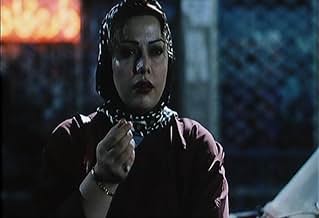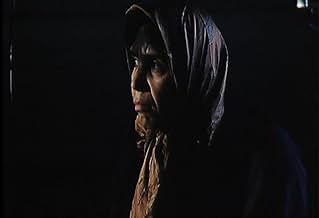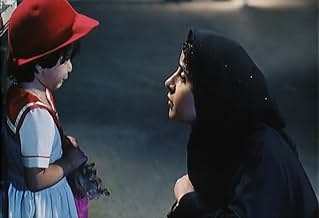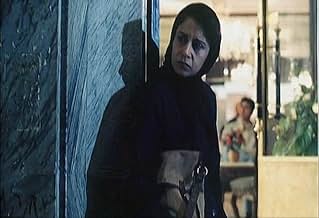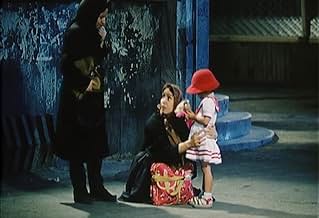IMDb RATING
7.4/10
7K
YOUR RATING
Various women struggle to function in the oppressively sexist society of contemporary Iran.Various women struggle to function in the oppressively sexist society of contemporary Iran.Various women struggle to function in the oppressively sexist society of contemporary Iran.
- Director
- Writers
- Stars
- Awards
- 12 wins & 7 nominations total
Maryiam Palvin Almani
- Maryam Parvin Almani (Arezou)
- (as Maryam Parvin Almani)
Fereshteh Sadre Orafaiy
- Fereshteh (Pari)
- (as Fereshteh Sadr Orafai)
- Director
- Writers
- All cast & crew
- Production, box office & more at IMDbPro
Featured reviews
I have seen several Iranian films in the past few weeks thanks to a short season of the films screened in the UK by Channel 4 a channel that can rise above the level of reality television when it puts its mind to it. Having seen them in a compact space of time, I had quickly gotten it in my head that many of those screened had come to international attention and various degrees of acclaim because they were "issue" films that looked at some aspect of Iranian life with at least a semi-critical eye. However none of them came close to the sort of anger with the system that was evident throughout this film.
The plot sees several stories that weave around one another to produce a film that looks at several women, all of whom are suffering in some way or other due to the general treatment of women in Iran. As a dramatic device it doesn't totally work because too little time is spent with each character to really get to know them or get into their stories and situations, but this struck me as being the film's second aim with the first quite clearly being the injustice with which women are treated. As such, the narrative never really engaged me in terms of the people in the story, but the general picture painted was interesting enough to hold my attention and make me care for the characters generally, even if I would struggle to put names to faces.
The actresses are all pretty good and most come off pretty natural and convincing, with only the odd moment here and there not really working. They all strike a rather tragic note with each of them trying to make out the best they can in life but really oppressed in so many ways whether it is small things like not easily moving in the streets by themselves or being rejected by their families to save honour. The direction is good, with different styles used for some of the characters but done in a subtle way to the point where I didn't notice until somebody pointed it out to me.
Overall this is a good film but not a brilliant one mainly because the narrative comes secondary to the criticism of the system. However it is worth seeing mainly because, without really ranting, it holds a lot of anger at the status of Iranian women and their treatment and the injustice within the system it may not be balanced but it is interesting and engaging.
The plot sees several stories that weave around one another to produce a film that looks at several women, all of whom are suffering in some way or other due to the general treatment of women in Iran. As a dramatic device it doesn't totally work because too little time is spent with each character to really get to know them or get into their stories and situations, but this struck me as being the film's second aim with the first quite clearly being the injustice with which women are treated. As such, the narrative never really engaged me in terms of the people in the story, but the general picture painted was interesting enough to hold my attention and make me care for the characters generally, even if I would struggle to put names to faces.
The actresses are all pretty good and most come off pretty natural and convincing, with only the odd moment here and there not really working. They all strike a rather tragic note with each of them trying to make out the best they can in life but really oppressed in so many ways whether it is small things like not easily moving in the streets by themselves or being rejected by their families to save honour. The direction is good, with different styles used for some of the characters but done in a subtle way to the point where I didn't notice until somebody pointed it out to me.
Overall this is a good film but not a brilliant one mainly because the narrative comes secondary to the criticism of the system. However it is worth seeing mainly because, without really ranting, it holds a lot of anger at the status of Iranian women and their treatment and the injustice within the system it may not be balanced but it is interesting and engaging.
Devastating film that details the harsh treatment of women in Iran. The film begins with a hospital scene, where a family take the news of a new baby girl in the family so harshly that one would think the child had been stillborn. Following that the story introduces us to a group of women, one after the other, each of them recent convicts (in Iran a woman is put in jail indefinitely for riding in a car with a man she is not related to) who have their own struggles to overcome before they can seek asylum from the clausterphobic society that surrounds them. The film isn't as satisfying as it should be (even given its subject matter), and definitely deserves to be more engrossing. It is, however, an important human rights issue worth examining and for all it shows of a world as different from our North American society, it deserves a good look from us all.
In Jafar Panahi's claustral feature debut, the brilliant central conceit is that being a woman in Iran is exactly equivalent to being the Wrong Man in an Alfred Hitchcock movie. In the movie's nameless Iranian city, the narrative baton is handed off from one woman to another, each of them missing an ID card, a chaperoning male, some form of social validation; without it, the long arm of the law winds around each woman like a python. Panahi's style--long, fluid takes that are at once bruisingly verite and dreamlike--buckles in the script's ingenious (and perhaps unconscious) major device: in this movie, women are a secret underworld with nodding, unspoken signals, just like hoodlums silently acknowledging one another in a gangster picture. There is no warm-hug sisterhood here, just the desperate mutual regard of the about-to-be-caught.
The honesty and unfussiness of the style of contemporary Iranian directors enables them to get away with stuff other artists might not, such as the ending of this movie, which, in a European or American movie, might seem thuddingly unsubtle. Here, it seems like the fulfillment of a nightmare--and it works because of Panahi's wittily blunt style, which is pitched somewhere between Iranian neorealism and Elaine May's MIKEY AND NICKY. And it works because of our constant recognition of the literal, physical courage of the movie: our glimpses of current state attitudes toward abortion, prostitution and corrupt police are so bald one marvels at Panahi's (and the cast and crew's) effrontery. Never has chador seemed less exotic and more evil--a manifestation of a terror of the beauty and pleasure of the female body that seems to engulf each character like a Cronenbergian plague. (The movie's wittiest touch is Cronenbergian, too: a woman character has a tic that gives her away to the cops--pregnancy-induced vomiting.)
The honesty and unfussiness of the style of contemporary Iranian directors enables them to get away with stuff other artists might not, such as the ending of this movie, which, in a European or American movie, might seem thuddingly unsubtle. Here, it seems like the fulfillment of a nightmare--and it works because of Panahi's wittily blunt style, which is pitched somewhere between Iranian neorealism and Elaine May's MIKEY AND NICKY. And it works because of our constant recognition of the literal, physical courage of the movie: our glimpses of current state attitudes toward abortion, prostitution and corrupt police are so bald one marvels at Panahi's (and the cast and crew's) effrontery. Never has chador seemed less exotic and more evil--a manifestation of a terror of the beauty and pleasure of the female body that seems to engulf each character like a Cronenbergian plague. (The movie's wittiest touch is Cronenbergian, too: a woman character has a tic that gives her away to the cops--pregnancy-induced vomiting.)
The "circle" in Jafar Panahi's great film is many things: the
structure of the film itself, which ends with the same image it
begins with; a location in Teheran, where a character meets a
friend in a movie theater; the circular stairs so many other
characters run up and down; the circling, hovering camera
movements that bring us face to face with the women in these
interlinked stories and the world they are caught in. Most of all,
perhaps, it is the constricting circle within which Iranian women
must live their lives, the tightly circumscribed rules and
expectations of a rigidly masculine universe. None of Panahi's
characters can escape this circle, though some try and one, at
least, believes that she can. The more experienced know the truth;
all they can do in running is map out the circumference of their
shrunken world.
It's easy to see The Circle as a film about the oppression of
women in Iran, but that would reduce it to the merely political--and
we should not forget that the film was made by an Iranian man,
and that three quarters of the Iranian electorate recently voted to
reelect President Khatami, a deeply intelligent voice for freedom
and dialogue who has had his own difficulties being heard.
Panahi's subject is far larger; a woman who grew up in an abusive
household told me that no other film had so accurately depicted
the experience of her youth, when the constraints on women's
lives were so much taken for granted that she was unaware there
was anything outside them. But those constraints are fatal. We
make our world together, through dialogue and interaction. To
deprive someone of voice and the chance to participate in that
process is to kill them, whether it is done through religious and
social sanctions or by a husband beating his wife. Panahi's
women are neither dead nor silent, even though their only
listeners are other women. Their tragedy finds echoes everywhere;
but in this film where theme and expression are so intimately
joined we, at least, can hear them.
structure of the film itself, which ends with the same image it
begins with; a location in Teheran, where a character meets a
friend in a movie theater; the circular stairs so many other
characters run up and down; the circling, hovering camera
movements that bring us face to face with the women in these
interlinked stories and the world they are caught in. Most of all,
perhaps, it is the constricting circle within which Iranian women
must live their lives, the tightly circumscribed rules and
expectations of a rigidly masculine universe. None of Panahi's
characters can escape this circle, though some try and one, at
least, believes that she can. The more experienced know the truth;
all they can do in running is map out the circumference of their
shrunken world.
It's easy to see The Circle as a film about the oppression of
women in Iran, but that would reduce it to the merely political--and
we should not forget that the film was made by an Iranian man,
and that three quarters of the Iranian electorate recently voted to
reelect President Khatami, a deeply intelligent voice for freedom
and dialogue who has had his own difficulties being heard.
Panahi's subject is far larger; a woman who grew up in an abusive
household told me that no other film had so accurately depicted
the experience of her youth, when the constraints on women's
lives were so much taken for granted that she was unaware there
was anything outside them. But those constraints are fatal. We
make our world together, through dialogue and interaction. To
deprive someone of voice and the chance to participate in that
process is to kill them, whether it is done through religious and
social sanctions or by a husband beating his wife. Panahi's
women are neither dead nor silent, even though their only
listeners are other women. Their tragedy finds echoes everywhere;
but in this film where theme and expression are so intimately
joined we, at least, can hear them.
While reading the various interviews with Jafar Panahi concerning his latest film "The Circle", I noticed that he always stresses the fact that his film is not a feminist film, but a humanist film. I'm reminded of the times I've been in a political conversation with someone and they've said "I'm no feminist but..." and then said something in defense of women's rights. Well, whether he intended it or not, Panahi has made a feminist film, because after all, feminism in its most basic form has nothing to do with hating men, but is merely a desire for the fair and equal treatment of women, and equal human rights is of course a cornerstone of humanism. I'm no scholar (and that I can say in all honesty) but yes, I would say I'm a feminist. I've never been on a march, and I've never read the works of any great feminist theorists, but to the core of my soul I believe in the equal and fair treatment of women, and if that doesn't make me a feminist I don't know what does.
Of course, all this discussion about feminism wouldn't matter if "The Circle" wasn't such a strong film. Panahi's film, almost universally praised, will receive no negative criticism here either. His use of narrative (most reviews compare the narrative style to "La Ronde" [1950], but I suppose comparisons could be made with "The Phantom of Liberty" [1974] and "Slacker" [1990], for that matter) might be perceived by some rob the characters of their individuality, but of course that is part of the point. In Iran today women are all grouped together, Panahi is saying, and they are seen as no more that a collective problem for men to deal with. Ultimately, there is nothing I can say about this film that hasn't been said before, but I wanted a chance to express my appreciation for this extraordinary myself.
Of course, all this discussion about feminism wouldn't matter if "The Circle" wasn't such a strong film. Panahi's film, almost universally praised, will receive no negative criticism here either. His use of narrative (most reviews compare the narrative style to "La Ronde" [1950], but I suppose comparisons could be made with "The Phantom of Liberty" [1974] and "Slacker" [1990], for that matter) might be perceived by some rob the characters of their individuality, but of course that is part of the point. In Iran today women are all grouped together, Panahi is saying, and they are seen as no more that a collective problem for men to deal with. Ultimately, there is nothing I can say about this film that hasn't been said before, but I wanted a chance to express my appreciation for this extraordinary myself.
Did you know
- TriviaPanahi adopted a different camera style to depict each of the four main protagonists' lives. For the first, an idealistic woman he used a handheld camera. For the second woman, the camera is mounted on a constantly moving dolly. The third woman's story is told at night in darker outside, and the camera is static with pans and tight close ups. For the last, least optimistic woman both the camera and the woman are completely immobile and very little sound is used.
- ConnectionsFeatured in Cinema Iran (2005)
- How long is The Circle?Powered by Alexa
Details
Box office
- Budget
- $10,000 (estimated)
- Gross US & Canada
- $440,554
- Gross worldwide
- $756,035
Contribute to this page
Suggest an edit or add missing content


